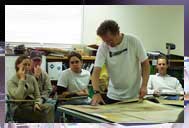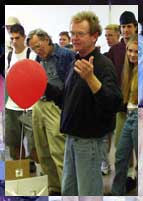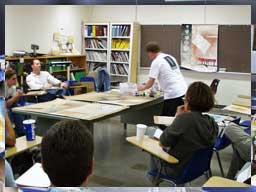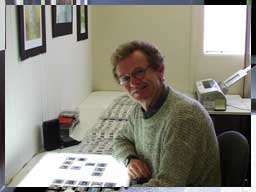| Gary Dwyer | Gary's answer to this years SLO Landscape question. |
|
|
What do you feel your responsibilities are, if any, to teach your students to improve or sustain the environment? One of the issues central to the idea of sustainability is in the definition of the term. And while the general populous appears to believe it to mean doing whatever it takes to have our present American life style continue indefinitely into the future, there is little to indicate this is possible. Some philosophers contend that whatever efforts we put into activities involving conservation, preservation, restoration and now, sustainability, are ultimately based in enlightened self interest. And at this moment in time I am inclined to believe them correct. If, in fact, we are using sustainability to save our own fannies, why is it within the purview of landscape architecture? It may be because many in the landscape architecture community came to the profession because they wanted to save whatever is left of the natural world from the despoliation caused by modern societies. This noble cause has many facets and some of them have been seriously overlooked by some who carry the banner of sustainability. The two which I would like to explore here are population and guilt. Guilt is the second issue and the level of guilt is connected to where you, individually draw the line. Most landscape architects have been trained to be sensitive to issues of environmental quality and consequently feel bad about the continuing degradation of the general environment and the constant reduction of the natural landscape. One of the reasons for our professional guilt is that we have been part of the problem - willing participants in thousands of housing developments, miles of idiotic suburban tracts, corporate parks and all the other forces leading to the asphalting of America. For at least fifty years, landscape architects have been involved (because of Market forces, they say, ) in every hair-brained scheme that has manipulated the land for some form of profit. And so, I argue, one of the reasons sustainability has become such a hot item is that we have done such a rotten job of saying no. That's right, no. No, I won't design a trailer park for you mister developer, because it is a crummy idea. And yes, I understand you can go down the street and get some other clown to do it, but I won't. We have held on to the idea that with care and a lot of compromise, we just might be able to do it better than that other person. It turns out we were wrong because the same stupid project gets done, on and to the land and whatever little flourishes we have provided are no improvement, they are only lipstick on the corpse. Conservation and preservation are whole and unique fields of endeavor and I suggest if a person is truly interested in lessening their guilt burden, in leaving their children a living planet, that they drop out of Landscape Architecture entirely; dump Autocad 2000 and go into politics. It is in politics where the power of change lives. What happens if one wants to stay in landscape architecture and still practice in a socially responsible manner? I would suggest the place to start is by marketing your services as a 'Site Finder.' No more force-fit of some idiotic program on land better left alone. Either you get on board at the beginning, or you don't get on board. A tough call you say? You bet, but I don't see anyone tearing out a parking lot to put in a farm or too many people planting soy beans on the roof of their Lexus. Things might be a lot better if we found the right place first. If someone appointed Landscape Architects to the position of steward of the land, then we are the only ones who believe that statement to be true. If we are stewards, we have done a very poor job of producing effective, meaningful (or) sustainable change. Some might think this statement to harsh. As a proof of my position I suggest one might consider the Cal Poly campus. A hap-hazard group of ugly buildings with no sense of planning or common purpose. Home to one of the largest colleges of architecture in the nation, which, for more than thirty years was summarily dismissed when it came to any substantive change in regard to campus and its facilities. If it weren't for the grounds keepers, and the gardeners it would look more like an Army base than a University. I am friends with a young professional couple who try to do the right things. They are vegetarians and believe in animal rights. They invest only with mutual funds and hold stock in corporations who have a "Green" rating. They recycle most waste. They buy electricity from a power company who says they sell "Clean Electricity" from sustainable sources. However, they both commute an hour each way to their engineering jobs for firms whose digital technologies may seem a boon to some, but those same corporations also dump uncounted tons of toxins into our rivers each day. (Recent studies indicate the chip manufacturers in the Silicon Valley are the largest single point polluters in the entire San Francisco Bay region.) William Mc Donough is an architect with a radical environmental streak. He says recycling is stupid and that what we need is a whole new approach. Try telling that to my well-meaning friends when they sit in their seven thousand pound SUV'S stuck in commute traffic, with cell phones glued to their ears. They, like everyone else, want it all. And at present are scrambling to find day care so both parents can have meaningful work. Oh, and what, by the way, do I say when they come to me and ask, what I recommend for plants around their newly yuppified house. That house is big enough to shelter three immigrant families, but only has two over-worked parents as small child and a dog. What is sustainable about that? It depends on where you are willing or perhaps, able to draw the line. What are you teaching them about improving or sustaining the environment? The cars are going by very slowly. People on the side walk stop and stare. The ambulance siren wails and the paramedics pull up to the curb. And then a voice says: "OK folks, move along. There is nothing to see here." The cop is lying, but he does not know what else to do. |
 |
|
 |
|
 |
|
 |
|
 |
